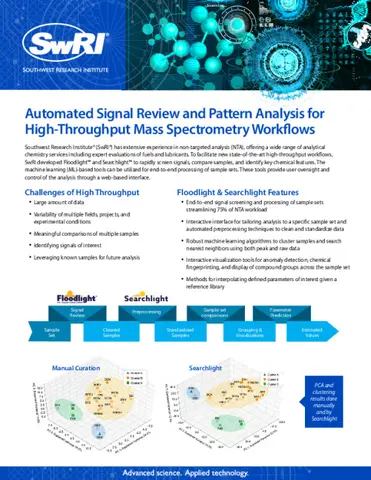
Automated Signal Review and Pattern Analysis for High-Throughput Mass Spectrometry Workflows
Advanced science. Applied technology.
Mass spectrometry (MS) generates high-quality data to identify known and unknown compounds in various samples. Mass spec data analysis provides qualitative and quantitative approaches for liquid chromatography (LC/MS), gas chromatography (GC/MS), and other separation techniques. Artificial intelligence-powered data analysis reveals insights into chemical compounds and molecular structures while offering high-quality automation to reduce time and effort to screen and analyze data.
Southwest Research Institute (SwRI) is at the forefront of methods development in mass spec data analysis, developing and applying next-generation deep learning algorithms. Our problem solvers collaborate across disciplines to develop mass spec data solutions for clients in the biomedical, pharmaceutical, environmental testing, and materials science sectors.
SwRI’s artificial intelligence mass spectrometry (AIMS) team includes data scientists and analytical chemists with a mission to expand humankind’s understanding of the hidden molecular world. We provide simple and scalable molecular intelligence for non-targeted and targeted analysis. Our expertise in mass spec data analysis draws upon decades of excellence in analytical chemistry and computer science to develop cheminformatics machine learning solutions. With expertise from a broad spectrum of industries, we can improve chemical identification and gain insights in materials science, biology, and medicine. Our interest in emerging fields includes:
We characterize chemical compounds and molecular data in our chemical identification laboratory, specializing in analytical chemistry software, standardized testing, and data science, including:
Cheminformatics tool that analyzes mass spectrometry data recognized by R&D World as one of the 100 most significant innovations of 2021.
SwRI’s cheminformatics machine learning tools help clients gain insights using deep learning algorithms for mass spec data analysis.
